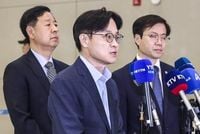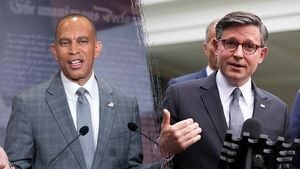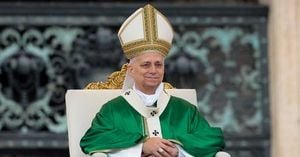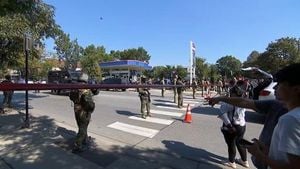On the morning of October 5, 2025, the South Korean presidential office convened an emergency trade strategy meeting, signaling a pivotal moment in the ongoing negotiations between South Korea and the United States over military cooperation and related tariffs. According to reporting by Etoday, the session, which began at 10:30 AM, brought together a formidable roster of officials, including Kim Yeong-beom, Chief Policy Officer, and Wi Seong-rak, National Security Office Director, as joint chairs. The meeting was also attended by Deputy Prime Minister Koo Yoon-chul, Foreign Minister Cho Hyun, Trade Negotiation Headquarters Director Yeo Han-goo, and several senior aides from the presidential office.
The urgency of the meeting stemmed from recent developments in the bilateral relationship, particularly the ongoing discussions about a South Korea-US military cooperation agreement and the economic implications tied to it. Kim Jeong-kwan, South Korea’s Minister of Trade, Industry, and Energy, joined remotely from the United States, where he had just met with US Commerce Secretary Howard Lutnick the previous evening. The results of that meeting were shared in real time with the officials gathered in Seoul, setting the stage for a robust debate on how to move forward with the sensitive negotiations.
According to the presidential office, the government reaffirmed its commitment to prioritizing national interests as it continues to engage with US counterparts on the specifics of tariff negotiations and military cooperation. “The government will continue follow-up consultations with the US side on the tariff negotiations, with the principle of putting national interest first,” a spokesperson told Etoday. This statement underscored the high stakes of the current talks, with both economic and security dimensions at play.
The seeds of this latest round of negotiations were sown earlier in October. On October 2, 2025, South Korea sent a revised memorandum of understanding (MOU) to the United States, concerning a $350 billion investment fund for bilateral defense cooperation. This updated MOU had been delivered to Secretary Lutnick by Minister Kim during his visit to the US from October 11 to 13, as reported by Etoday. The MOU, which involves coordination with a large-scale military force numbering some 3,500 personnel, is a cornerstone of the evolving partnership between the two allies.
In addition to the economic aspects, the agreement aims to deepen the integration of South Korean and US military cooperation systems. The October 5 meeting in Seoul was primarily focused on finalizing the terms of this military cooperation agreement, ensuring that both countries’ defense and intelligence-sharing frameworks are aligned and robust. The meeting addressed the full scope of the military cooperation budget, with officials agreeing to proceed without delay to maintain momentum in the alliance.
But the path to ratification has not been without its complications. According to a South Korean military official who spoke at a briefing at the Washington DC headquarters of the US military on October 10, 2025, the cooperation agreement was confirmed during a period when the Trump delegation was active in the United States. The official explained that the agreement was reached in close coordination with both the US military and local government agencies, reflecting a high degree of integration between the two countries’ armed forces. “The cooperation involved the integration of South Korean and US military personnel and the sharing of military intelligence and defense systems,” the official stated, as reported by Etoday.
Complicating matters further, the return of approximately 300 South Korean personnel stationed in the United States became a flashpoint in the broader negotiations. As reported by Etoday on October 10, the repatriation process was delayed after former President Donald Trump advised that the skilled South Korean personnel should remain in the US to help train local forces, rather than return home as initially planned. This unusual intervention was confirmed by South Korean Foreign Minister Cho Hyun following a meeting with US Secretary of State Marco Rubio. Minister Cho recounted, “Secretary Rubio confirmed that the reason for the delay was President Trump’s directive. President Trump instructed that the return procedures be temporarily suspended to hear South Korea’s position on whether it would be more appropriate for the detained South Korean nationals to stay and train local personnel or to return home.”
The South Korean government, however, advocated for the immediate return of its citizens, citing their prolonged detention and mounting fatigue. Minister Cho relayed this position to Secretary Rubio, who ultimately agreed to allow the repatriation. “Minister Cho conveyed that our citizens are already greatly surprised and exhausted, so it would be desirable for them to return first and, if necessary, work in the US again later. Secretary Rubio accepted this and agreed to permit the return of the detained South Koreans,” a Foreign Ministry official said, as quoted by Etoday.
Another point of contention was the manner in which the detainees would be transported to the airport. There had been disagreements over the use of physical restraints such as handcuffs during their transfer. However, in response to a strong request from the South Korean government, President Trump directed that the detainees be allowed to move without restraints. “President Trump’s latest action was based on the trust and bond formed between the two leaders at the recent summit, as well as our government’s consistent stance on the detention issue,” the official explained.
Throughout this complex diplomatic episode, South Korea’s Foreign Ministry has remained steadfast in its support for its citizens. “The Foreign Ministry will continue to provide all possible assistance, working closely with US authorities to ensure the safe release and return of our nationals,” a spokesperson affirmed.
These developments come at a time when the US and South Korea are seeking to strengthen their alliance in the face of regional security challenges and shifting global dynamics. The military cooperation agreement, once ratified, is expected to deepen defense ties, enhance intelligence sharing, and streamline joint operations. At the same time, the negotiations over tariffs and economic cooperation reflect the broader economic stakes involved, as both countries navigate an increasingly complex international landscape.
As the two governments move toward finalizing the military cooperation agreement and resolving the remaining issues surrounding the detained personnel, officials on both sides have signaled a willingness to compromise—albeit with the clear intention of safeguarding their respective national interests. The coming weeks will be crucial, as the outcomes of these negotiations are likely to shape the future of the US-South Korea alliance for years to come.
With stakes this high and the eyes of both nations watching closely, the next steps will test the resilience and adaptability of a partnership that has long been central to security and prosperity in Northeast Asia.




